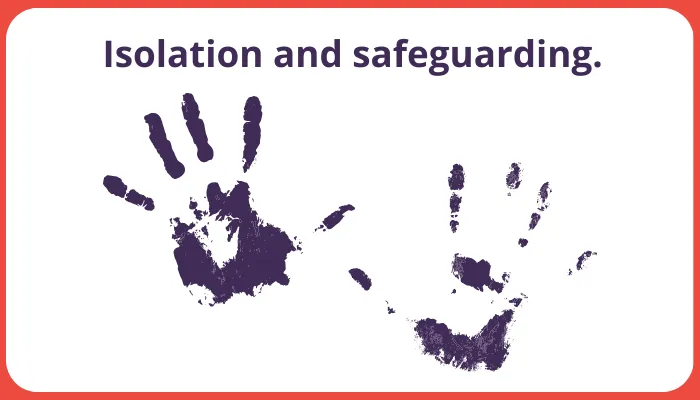Every child's well-being matters.
Types of Abuse Articles
Quick Access
Abuse of Authority
Abuse of Discretion
Abuse of Power
Behavioural Indications
Breast Ironing
County Lines
Cultural Differences (Physical Abuse)
Domestic Abuse
Economic Abuse
Emotional Signs
Exposure to Substance Abuse
Failure to Thrive
Female Genital Mutilation (FGM)
Forced Marriage
Hate Crimes & Targeted Harassment
Impact of Domestic Violence
Impact of Environment
Impact on Development
Institutional Abuse
Isolation
Modern Slavery
Neglect
Online Abuse
Parental Behaviours
Physical Abuse
Radicalisation
Religious Abuse
Restraint
Sexual Abuse
Types of Abuse
Witnessing Domestic Abuse

If a child is isolated can this affect safeguarding?
Custom HTML/CSS/JAVASCRIPT
Safeguarding children means ensuring they are safe, healthy, and happy. One crucial factor that can affect a child's safeguarding is isolation. Isolation occurs when a child is kept away from others, and it can cause some severe problems.
When Children are isolated, they might feel lonely and sad. This can lead to problems with their emotions and thoughts. Imagine being alone without friends or family to talk to—it's not a good feeling. This is why we need to pay attention to how children feel and help them when they seem lonely or down.
Being around other children helps children learn important things, like how to talk to others, share, and be a good friend. If a child is always by themselves, they might miss out on these essential lessons. Learning to get along with others is like a superpower that helps children in school and life. So, we need to make sure children have chances to play and be with friends.
Isolated children might be more at risk of bad things happening to them. When there's no one around to notice if something is wrong, it can be harder to keep children safe. We want to ensure that children are protected from harm or danger, and being alone too much can make that more challenging.
Children learn a lot in school, and being with teachers and friends helps them do well. If a child is always on their own, they might miss important lessons and stay caught up in their studies. Education is a vital part of growing up, and we want every child to have the chance to learn and succeed.
Isolated children might need more exercise or healthy foods because no one can help them. Staying healthy is super important; children need the right food and exercise to grow strong. We must ensure children have what they need to stay healthy and happy.
Keeping children safe and happy involves ensuring they are not isolated. We all play a part in looking out for children and ensuring they have friends, learn important things, and stay healthy. If you ever think a child might be lonely or in danger, it's essential to tell a trusted adult so they can help.
Let's work together to ensure all children grow up safe, loved, and ready for a bright future.
AUTHOR:- Iona has nearly 10 years of experience supporting nurseries and childminders in curriculum planning, leadership, and safeguarding. Her writing is informed by public information and sector insight, aiming to provide accessible, practical support for professionals working with children. She is part of the On the Button team, helping deliver Well-being, Safeguarding and Complaint Management Software that empowers practitioners to identify concerns early and act confidently.
On the Button provides innovative software tailored to the needs of the early years sector, with a strong focus on EYFS well-being and early years safeguarding. Our tools help senior practitioners to confidently track concerns, maintain robust records, and respond effectively — all while meeting statutory guidance. From early years complaint management to team-wide safeguarding alerts, our platform puts children's safety and emotional health first.
Quick Access
Abuse of Authority
Abuse of Discretion
Abuse of Power
Behavioural Indications
Breast Ironing
County Lines
Cultural Differences (Physical Abuse)
Domestic Abuse
Economic Abuse
Emotional Signs
Exposure to Substance Abuse
Failure to Thrive
Female Genital Mutilation (FGM)
Forced Marriage
Hate Crimes & Targeted Harassment
Impact of Domestic Violence
Impact of Environment
Impact on Development
Institutional Abuse
Isolation
Modern Slavery
Neglect
Online Abuse
Parental Behaviours
Physical Abuse
Radicalisation
Religious Abuse
Restraint
Sexual Abuse
Types of Abuse
Witnessing Domestic Abuse

If a child is isolated can this affect safeguarding?
Custom HTML/CSS/JAVASCRIPT
Safeguarding children means ensuring they are safe, healthy, and happy. One crucial factor that can affect a child's safeguarding is isolation. Isolation occurs when a child is kept away from others, and it can cause some severe problems.
When Children are isolated, they might feel lonely and sad. This can lead to problems with their emotions and thoughts. Imagine being alone without friends or family to talk to—it's not a good feeling. This is why we need to pay attention to how children feel and help them when they seem lonely or down.
Being around other children helps children learn important things, like how to talk to others, share, and be a good friend. If a child is always by themselves, they might miss out on these essential lessons. Learning to get along with others is like a superpower that helps children in school and life. So, we need to make sure children have chances to play and be with friends.
Isolated children might be more at risk of bad things happening to them. When there's no one around to notice if something is wrong, it can be harder to keep children safe. We want to ensure that children are protected from harm or danger, and being alone too much can make that more challenging.
Children learn a lot in school, and being with teachers and friends helps them do well. If a child is always on their own, they might miss important lessons and stay caught up in their studies. Education is a vital part of growing up, and we want every child to have the chance to learn and succeed.
Isolated children might need more exercise or healthy foods because no one can help them. Staying healthy is super important; children need the right food and exercise to grow strong. We must ensure children have what they need to stay healthy and happy.
Keeping children safe and happy involves ensuring they are not isolated. We all play a part in looking out for children and ensuring they have friends, learn important things, and stay healthy. If you ever think a child might be lonely or in danger, it's essential to tell a trusted adult so they can help.
Let's work together to ensure all children grow up safe, loved, and ready for a bright future.
AUTHOR:- Iona has nearly 10 years of experience supporting nurseries and childminders in curriculum planning, leadership, and safeguarding. Her writing is informed by public information and sector insight, aiming to provide accessible, practical support for professionals working with children. She is part of the On the Button team, helping deliver Well-being, Safeguarding and Complaint Management Software that empowers practitioners to identify concerns early and act confidently.
On the Button provides innovative software tailored to the needs of the early years sector, with a strong focus on EYFS well-being and early years safeguarding. Our tools help senior practitioners to confidently track concerns, maintain robust records, and respond effectively — all while meeting statutory guidance. From early years complaint management to team-wide safeguarding alerts, our platform puts children's safety and emotional health first.

If a child is isolated can this affect safeguarding?
Custom HTML/CSS/JAVASCRIPT
Safeguarding children means ensuring they are safe, healthy, and happy. One crucial factor that can affect a child's safeguarding is isolation. Isolation occurs when a child is kept away from others, and it can cause some severe problems.
When Children are isolated, they might feel lonely and sad. This can lead to problems with their emotions and thoughts. Imagine being alone without friends or family to talk to—it's not a good feeling. This is why we need to pay attention to how children feel and help them when they seem lonely or down.
Being around other children helps children learn important things, like how to talk to others, share, and be a good friend. If a child is always by themselves, they might miss out on these essential lessons. Learning to get along with others is like a superpower that helps children in school and life. So, we need to make sure children have chances to play and be with friends.
Isolated children might be more at risk of bad things happening to them. When there's no one around to notice if something is wrong, it can be harder to keep children safe. We want to ensure that children are protected from harm or danger, and being alone too much can make that more challenging.
Children learn a lot in school, and being with teachers and friends helps them do well. If a child is always on their own, they might miss important lessons and stay caught up in their studies. Education is a vital part of growing up, and we want every child to have the chance to learn and succeed.
Isolated children might need more exercise or healthy foods because no one can help them. Staying healthy is super important; children need the right food and exercise to grow strong. We must ensure children have what they need to stay healthy and happy.
Keeping children safe and happy involves ensuring they are not isolated. We all play a part in looking out for children and ensuring they have friends, learn important things, and stay healthy. If you ever think a child might be lonely or in danger, it's essential to tell a trusted adult so they can help.
Let's work together to ensure all children grow up safe, loved, and ready for a bright future.
AUTHOR:- Iona has nearly 10 years of experience supporting nurseries and childminders in curriculum planning, leadership, and safeguarding. Her writing is informed by public information and sector insight, aiming to provide accessible, practical support for professionals working with children. She is part of the On the Button team, helping deliver Well-being, Safeguarding and Complaint Management Software that empowers practitioners to identify concerns early and act confidently.
On the Button provides innovative software tailored to the needs of the early years sector, with a strong focus on EYFS well-being and early years safeguarding. Our tools help senior practitioners to confidently track concerns, maintain robust records, and respond effectively — all while meeting statutory guidance. From early years complaint management to team-wide safeguarding alerts, our platform puts children's safety and emotional health first.
Quality Early Years Ltd.,
Dickens House,
Guithavon Street,
Witham, Essex,
England, CM8 1BJ
© Quality Early Years Ltd 2025

Find On the Button
on Social Media

